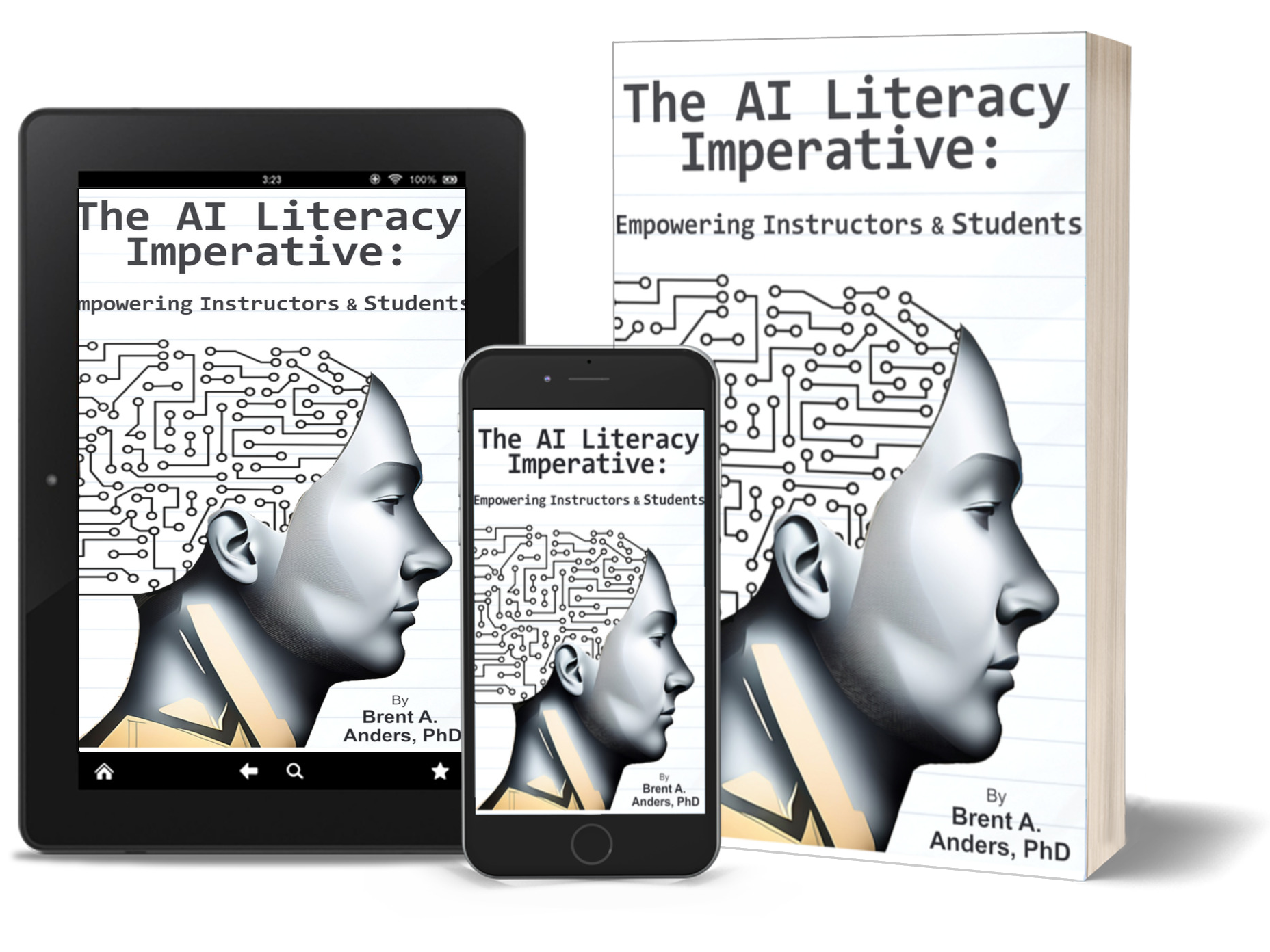The Age of AI is Upon Us.
Generative AI is changing the landscape of higher education, in both good and bad ways (Balch, 2023). In a world where AI skills and fluency will be necessary and marketable, colleges and universities have made efforts to embrace AI in the classroom (e.g., Balch & Blanck, 2025; Butulis, 2023; Parks & Oslick, 2024) and to provide their students with instruction and practice in using AI in productive and ethical ways (e.g., Schoeder, 2024). As the capacity of AI grows to complete increasingly complex tasks, we (as college instructors) may wonder what we can offer our students in the age of AI. Microsoft co-founder Bill Gates recently stated in an interview that advances in AI will mean the humans will no longer be needed “for most things,” and stated that doctors and teachers in particular could be replaced by AI (CNBC, 2025). Microsoft AI CEO Mustafa Suleyman stated the AI, because it will have the ability to complete tasks faster and more reliably than human workers, will change occupations broadly and will have a “hugely destabilizing” impact on the occupational landscape. Suleyman further stated that the fundamental purpose of AI is to be labor replacing (CNBC, 2025).
In higher education, we see our students use AI in many ways, to provide both authorized and unauthorized aid in their completion of assignments. We have crafted AI policies to help our students understand how AI is and is not permitted in our classes, and some of us have devoted energy to try to detect and police AI use in our classes. Given this reality in which AI can provide and synthesize information for and to our students at their requests in seconds, it is not completely paranoid to ask the question, “What can we, as college instructors, offer our students in the age of AI?”
Why College Instructors Matter: A Student’s Perspective
I had a conversation with one of my students recently about this exact question. He visited my office and in the course of our conversation he asked me how I thought I would use AI as a college instructor moving forward. I admit that I did not have the most thoughtful or eloquent answer as I discussed trying to keep up with advances, to recognize the utility of AI, but also to continue to foster critical thinking skills in my students. He told me that he uses ChatGPT all the time (and he is not alone among students in doing so; Kichizo Terry, 2023). He told me how quick and convenient it is. He surprised me, though, by telling me that he uses ChatGPT despite thinking that it would create “brain rot” in him and other students because it was doing their thinking for them. He then gave me the answer about what we can offer our students. He said that college instructors are not needed to give information to their students, at least not the foundations, definitions, etc., that comprise of a lot of traditional lecturing. He said that students could read much of the content off our PowerPoint slides and in the assigned readings without AI. What college instructors are needed for, he said, is to motivate our students to learn. We are needed to inspire students to come to class, to ask questions, to work out the answers with them. We are needed to engage them and to help them develop curiosity and critical thinking skills to offset their potential AI-induced brain rot. He said that students have had access to the information we teach prior to AI. They could always find and read the content on their own. What we can do as instructors is inspire them to learn the content, to ask their own questions, and to perhaps motivate their AI use to serve their own curiosity beyond the conversations in our classes.
Our Role as Instructors in the Age of AI
This is our role as instructors in the age of AI. This was our role as instructors prior to the advent of AI. As instructors, our role is not just to provide access to content. We cannot compete with the other resources available to our students in our fundamental content knowledge. Our role is to excite our students about the content. Our role is to inspire our students to learn that content. Our role is to bring PEACE to our classes so that our students will see the value in our classes and will engage in our classes to deepen their curiosity and their learning. PEACE is an acronym that stands for Preparation, Expertise, Authenticity, Caring, and Engagement (Saucier, 2019; Saucier, 2022; Saucier, Jones, Schiffer, & Renken, 2022). Beginning on the first days of our classes (Saucier, 2020; Saucier, Renken, Fulton, & Schiffer, 2024), we can demonstrate to our students that we have a plan, that we have content knowledge, that we are real living human beings with relatable thoughts and emotions, that we care about our students and their learning, and that we are enthusiastic and invested in the content we will learn with them. We can nurture our students’ intrinsic motivation to learn the content through demonstrations of our own engagement, activating the process of trickle-down engagement by which our own engagement as instructors promotes our students’ engagement and their subsequent learning (Saucier, Miller, Martens, & Jones, 2022). We can cue our engagement in the content by intentionally and explicitly sharing our own enthusiasm about the content and its value and importance (Saucier, Jones, Miller, Schiffer, Mills, & Renken, 2025).
AI is here. It is here to stay. It is a valuable tool that can accomplish important tasks quickly. Our students recognize its value and are already using it in many ways, both in and out of our classes. As college instructors, we are best served in providing our students with something that AI is not yet able to – our authentic investment in the learning, experiences, and success of our students. We have the ability to inspire our students’ wonder and curiosity in ways that will inspire them to be intrinsically motivated to learn and to keep learning. We should embrace this role as we teach in the age of AI.
Donald A. Saucier, Ph.D. (2001, University of Vermont) is a University Distinguished Teaching Scholar and Professor of Psychological Sciences at Kansas State University. Saucier has published more than 100 peer-reviewed journal articles and is a Fellow of the Society for Personality and Social Psychology, the Society for the Psychological Study of Social Issues, the Society for Experimental Social Psychology, and the Midwestern Psychological Association. His awards and honors include the University Distinguished Faculty Award for Mentoring of Undergraduate Students in Research, the Presidential Award for Excellence in Undergraduate Teaching, and the Society for the Psychological Study of Social Issues Teaching Resource Prize. Saucier is also the Faculty Associate Director of the Teaching and Learning Center at Kansas State University and offers a YouTube channel called “Engage the Sage” that describes his teaching philosophy, practices, and experiences.
References
Balch, D. E. (2023, August 25th). Artificial intelligence: The rise of ChatGPT and its implications. Faculty Focus. https://www.facultyfocus.com/articles/teaching-with-technology-articles/artificial-intelligence-the-rise-of-chatgpt-and-its-implications/
Balch, D. E., & Blanck, R. (2025, March 31st). AI-powered teaching: Practical tools for community college faculty. Faculty Focus. https://www.facultyfocus.com/articles/teaching-with-technology-articles/ai-powered-teaching-practical-tools-for-community-college-faculty/
Butulis, M. (2023, December 6th). Embracing artificial intelligence in the classroom. Faculty Focus. https://www.facultyfocus.com/articles/teaching-with-technology-articles/embracing-artificial-intelligence-in-the-classroom/
CNBC (2025). “Bill Gates: Within 10 years, AI will replace many doctors and teachers—humans won’t be needed ‘for most things’.” Published March 26, 2025.
Kichizio Terry, O. (2023, May 12th). I’m a student. You have no idea how much we’re using ChatGPT. Chronicles of Higher Education. https://www.chronicle.com/article/im-a-student-you-have-no-idea-how-much-were-using-chatgpt
Parks, M., & Oslick, M. E. (2024, May 22nd). Empowering student learning: Navigating artificial intelligence in the college classroom. Faculty Focus. https://www.facultyfocus.com/articles/teaching-with-technology-articles/empowering-student-learning-navigating-artificial-intelligence-in-the-college-classroom/
Saucier, D. A. (2019, September 9th). Bringing PEACE to the classroom. Faculty Focus. https://www.facultyfocus.com/articles/philosophy-of-teaching/bringing-peace-to-the-classroom/
Saucier, D. A. (2020). Rocking your first day of class (and beyond!). E-xcellence in Teaching, Society for the Teaching of Psychology. Retrieved from: https://teachpsych.org/E-xcellence-in-Teaching-Blog/8454525
Saucier, D. A. (2022, February 23rd). Bringing PEACE to support all students. Inside Higher Ed. Retrieved from: https://www.insidehighered.com/views/2022/02/23/professors-should-learn-about-respond-students-unique-experiences-opinion
Saucier, D. A., Jones, T. L., Miller, S. S., Schiffer, A. A., Mills, H. D., & Renken, N. D. (2025). Cueing engagement: Applying the trickle-down engagement model to instructors’ in-class behaviors. Teaching of Psychology, 52(1), 45-52.
Saucier, D. A., Jones, T. L., Schiffer, A. A., & Renken, N. D. (2022). The empathetic course design perspective. Applied Economics Teaching Resources, 4(4), 101-111.
Saucier, D. A., Miller, S. S., Martens, A. L., & Jones, T. L. (2022). Trickle down engagement: Effects of perceived teacher and student engagement on learning outcomes. International Journal of Teaching and Learning in Higher Education, 33(2), 168-179.
Saucier, D. A., Renken, N. D., Fulton, C. E., & Schiffer, A. A. (2024, August 26th). Making memories on the first day of class. Faculty Focus. https://www.facultyfocus.com/teaching-strategies/making-memories-on-the-first-day-of-class/
Schoeder, R. (2024, July 31st). Our responsibility to teach AI to students. Insider Higher Ed. https://www.insidehighered.com/opinion/blogs/online-trending-now/2024/07/31/our-responsibility-teach-ai-students



